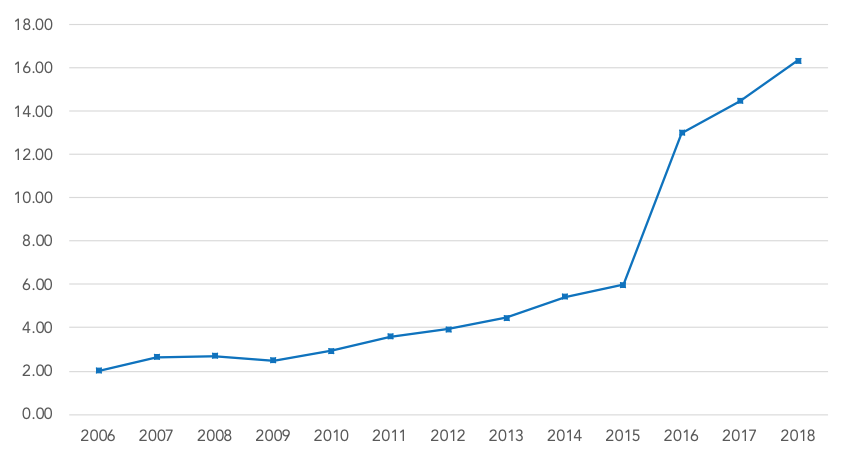
Three questions on revenue growth to a military and business leader
Philippe recently spoke with Herman Bulls, Vice Chairman, Americas, JLL and a seasoned Corporate Board Director. JLL is a global professional services firm specializing in real estate and investment management.Bulls, a 30-year veteran of the firm, founded JLL’s Public Institutions division, which focuses on providing real estate services to federal, state and local governments, colleges and universities and not for profit organizations. He currently sits on the board of USAA, Comfort Systems and is on the board of Governors of the American Red Cross organization. He also serves in the Real Estate Advisory Committee for New York State Teachers’ Retirement System, one of the largest pension funds in America. Former NYSE board service includes Tyco, Exelis (ITT spin-off) and Computer Sciences Corporation (CSC). Bulls retired as a Colonel from the Army Reserve, after spending over 11 years on active duty before jumping to the corporate world. He had a total of 30 years military service. He is a graduate of the United States Military Academy at West Point and of the Harvard Business School. He has decades of real estate, leadership and finance experience with a particular knowledge of team building, marketing and strategic development.
Can you describe the fastest revenue growth situation you have ever been involved with?
I joined JLL 30 years ago. At the time, the company only had 300 professionals. Today, we are over 90,000 employees around the world. We operate in 80 countries covering three geographic regions: the Americas, APAC and EMEA. Over the last ten years, we completed nearly 90 strategic acquisitions as part of our global growth strategy. JLL’s annual total revenue reached a record high of $16.3 billion last year and we were involved in property and facility management of over 4.6 billion square feet, closed $179 billion in capital markets transactions, and completed 37,500 leasing transactions representing 1.1 billion square feet of space. Our market cap was $5.8 billion at the end of 2018 and we ranked #189 on the Fortune 500 list for 2019.

JLL annual revenue (in $ billions)
What was the most daunting growth challenge you faced and the actions you took?
The biggest challenge to keep growing at a good rate is to establish and maintain strong leadership. Good leaders are concerned about the mission and the people. This is the foundational piece of the puzzle that enables the establishment of trust between management and employees. Trust, in turn, enables people to be their authentic self, which then unleashes creativity and encourages innovation. It is hard, but so important to recognize individuality and understand what the mission is, while, at the same time, encourage and accept a measured level of risk.
In the 70’s and earlier when I was a student at West Point, it was all about stressing new cadets with harsh physical treatment and mental harassment. The goal was to determine how tough you were by pushing you in a very stressful environment both physically and mentally. The idea was, that yelling and screaming at new cadets helped to develop their character. West Point admits about 1 in 10 applicants and we were taking these talented young men (at the time and now women) and basically trying to run them out of the academy. The problem is that form of leadership was inconsistent with what the graduates would do as junior officers in the Army. Therefore, the leadership lessons were not really transferable and we were losing some great leaders in the process. Now, it is different. We teach them positive leadership skills, ways to engage with problems in a creative way, and teamwork. It does not mean we are less tough with them, mentally or physically, but it is a different approach that is more aligned with the reality of the world—establishing standards of performance and holding them to those high standards. My understanding of the basic concepts of leadership is one of the reasons my transition from the army to the corporate world was not as difficult as sometimes the perceived notion might be about a military person.
As an experienced CEO and board member, what advice would you give a CEO to accelerate the growth of his/her business?
It is important that the CEO, C suite, and his/her board understand the following major shift that is happening now: it is not about representing shareholders, but all stakeholders – investors, employees, suppliers, local communities in which the business operates, and regulators.
A prime example of this occurred on August 19th earlier this year, nearly 200 CEOs from the Business Roundtable, including Tim Cook from Apple and Jamie Dimon from JPMorgan Chase and Alex Gorsky, (a friend and fellow West Point graduate) of Johnson & Johnson, argued that companies must not only deliver value to their customers, but also invest in employees, protect the environment, and fairly and ethically engage with their suppliers. This flies against the notion that the role of the corporation is to maximize short term profits at all cost.
This perspective will take a long time to become mainstream, like it took a long time to vertically integrate the army or re-invent government during the Clinton administration when I served. It will happen a step at a time, but it is critical that CEOs think and plan for this fundamental transition.
The other advice I would share is to think hard about diversity. Diversity creates a better, more inclusive culture. A diverse team is more creative, more effective, and brings more points of view than a non-diverse one. By some estimates, in 2035 the current majority in America will be the minority. This means that customers and employees will reflect this demographic as well. Therefore, to serve markets, it will be important to have a team which understands the markets. This will require diversity as a business imperative not as a social goal. Hockey legend Wayne Gretzky is quoted as saying “Skate to where the puck is going to be, not where it has been.” This means leaders must place a premium on focusing on the future—where the puck is going to be—to be competitive in the next decade. To remain competitive, it is important that organizations start to build a bench of diverse talent now. It takes time to build a bench of talent. Smart organizations will overshoot the recruitment funnel now so they will have the right management team in place by 2035…which is only a decade and a half away. This strategy will be critically important and will produce better corporations and more effective businesses to compete in international markets.